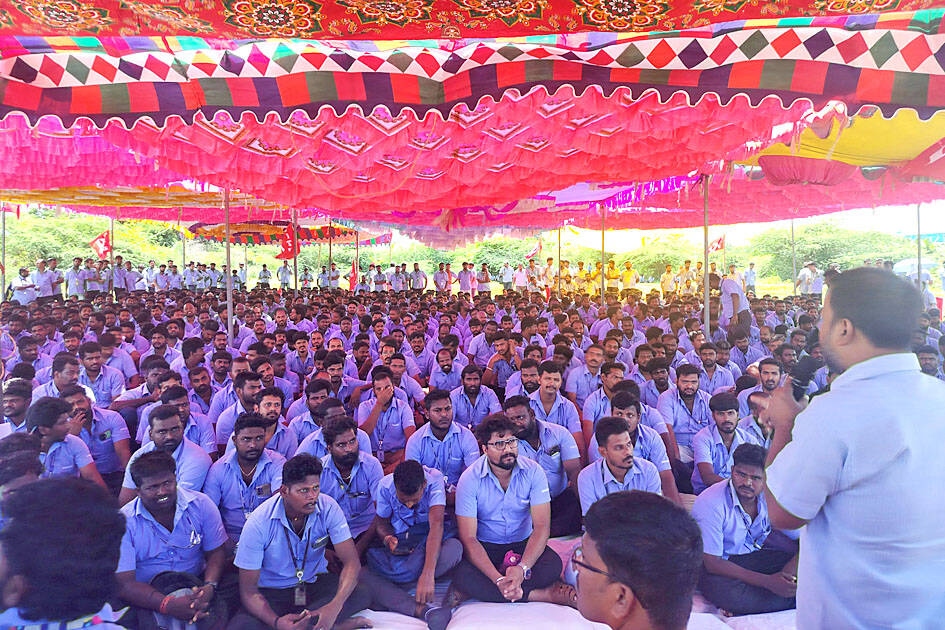Operations at Samsung Electronics Co’s plant in southern India were disrupted for a second day yesterday by hundreds of employees striking for higher wages, in a rare episode of labor unrest for the South Korean company.
The strike at India’s biggest consumer goods company comes ahead of the festive season. The plant is one of two factories in India, which Samsung counts as a key growth market.
Two sources with direct knowledge of the matter said it contributed 20 to 30 percent of Samsung’s annual revenue of US$12 billion in India.

Photo: Reuters
Posters reading “Indefinite Strike” went up outside the factory in Sriperumbudur near the city of Chennai, where hundreds of workers in company uniforms set up tents to shade them from the heat.
“We are striking for the second day,” union leader E. Muthukumar said.
About half of the factory’s daily production was affected when many workers stayed away on Monday, and the protest continues to press their demand for higher wages, better working hours and company recognition of the union.
Samsung India did not respond to a request for comment.
On Monday, a spokesperson said that the company actively engaged with workers “to address any grievances they may have and comply with all laws and regulations.”
Samsung employs about 1,800 workers at the plant, which makes items such as refrigerators, washing machines and televisions, while a bigger plant in the northern state of Uttar Pradesh turns out smartphones.
Workers are demanding equal remuneration for those with the same length of experience, at least half a dozen employees Reuters spoke to on condition of anonymity said.
One poster outside the factory exhorted state labor officials not to support the management, advising instead: “Discuss and solve demands from the labor union with union officials.”

When an apartment comes up for rent in Germany’s big cities, hundreds of prospective tenants often queue down the street to view it, but the acute shortage of affordable housing is getting scant attention ahead of today’s snap general election. “Housing is one of the main problems for people, but nobody talks about it, nobody takes it seriously,” said Andreas Ibel, president of Build Europe, an association representing housing developers. Migration and the sluggish economy top the list of voters’ concerns, but analysts say housing policy fails to break through as returns on investment take time to register, making the

‘SILVER LINING’: Although the news caused TSMC to fall on the local market, an analyst said that as tariffs are not set to go into effect until April, there is still time for negotiations US President Donald Trump on Tuesday said that he would likely impose tariffs on semiconductor, automobile and pharmaceutical imports of about 25 percent, with an announcement coming as soon as April 2 in a move that would represent a dramatic widening of the US leader’s trade war. “I probably will tell you that on April 2, but it’ll be in the neighborhood of 25 percent,” Trump told reporters at his Mar-a-Lago club when asked about his plan for auto tariffs. Asked about similar levies on pharmaceutical drugs and semiconductors, the president said that “it’ll be 25 percent and higher, and it’ll

NOT TO WORRY: Some people are concerned funds might continue moving out of the country, but the central bank said financial account outflows are not unusual in Taiwan Taiwan’s outbound investments hit a new high last year due to investments made by contract chipmaker Taiwan Semiconductor Manufacturing Co (TSMC, 台積電) and other major manufacturers to boost global expansion, the central bank said on Thursday. The net increase in outbound investments last year reached a record US$21.05 billion, while the net increase in outbound investments by Taiwanese residents reached a record US$31.98 billion, central bank data showed. Chen Fei-wen (陳斐紋), deputy director of the central bank’s Department of Economic Research, said the increase was largely due to TSMC’s efforts to expand production in the US and Japan. Investments by Vanguard International

WARNING SHOT: The US president has threatened to impose 25 percent tariffs on all imported vehicles, and similar or higher duties on pharmaceuticals and semiconductors US President Donald Trump on Wednesday suggested that a trade deal with China was “possible” — a key target in the US leader’s tariffs policy. The US in 2020 had already agreed to “a great trade deal with China” and a new deal was “possible,” Trump said. Trump said he expected Chinese President Xi Jinping (習近平) to visit the US, without giving a timeline for his trip. Trump also said that he was talking to China about TikTok, as the US seeks to broker a sale of the popular app owned by Chinese firm ByteDance Ltd (字節跳動). Trump last week said that he had